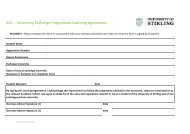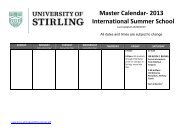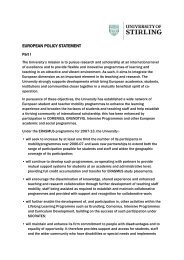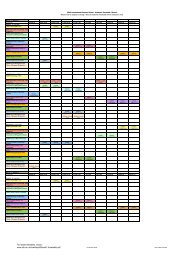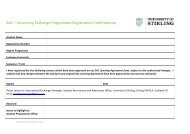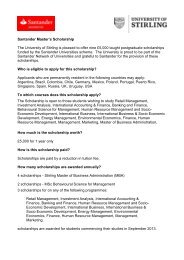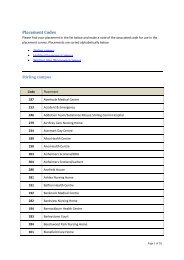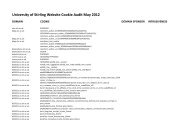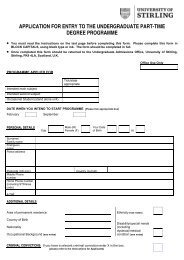Supporting a uK SucceSS Story: The impacT of - Research Councils ...
Supporting a uK SucceSS Story: The impacT of - Research Councils ...
Supporting a uK SucceSS Story: The impacT of - Research Councils ...
You also want an ePaper? Increase the reach of your titles
YUMPU automatically turns print PDFs into web optimized ePapers that Google loves.
Mental training<br />
An occasion such as the Olympic Games puts<br />
considerable mental pressure on an athlete<br />
to perform well. While some will thrive under<br />
this pressure, some athletes struggle with and<br />
are susceptible to ‘choking’ at the moment <strong>of</strong><br />
competition. <strong>Research</strong>ers at Bangor University’s<br />
Institute for the Psychology <strong>of</strong> Elite Performance<br />
(IPEP) have been examining how individual<br />
differences in personality might predict how well<br />
athletes perform under pressure.<br />
In particular, the researchers have found that<br />
athletes with a narcissistic personality think <strong>of</strong><br />
themselves as excellent performers and tend<br />
to perform very well under<br />
the pressure <strong>of</strong> competition.<br />
However, in contrast, nonnarcissistic<br />
individuals may<br />
be more susceptible to<br />
choking under pressure and<br />
not performing to the best <strong>of</strong><br />
their ability. By considering<br />
these individual differences in<br />
personalities, coaches and sport<br />
psychology practitioners can<br />
tailor their training to meet the<br />
specific needs <strong>of</strong> athletes. This<br />
can help increase the chances<br />
<strong>of</strong> successful performances<br />
at major events such as the<br />
Olympic and Paralympic<br />
Games.<br />
A collaborative project<br />
between five UK universities<br />
is looking to advance understanding <strong>of</strong> emotion<br />
regulation and how this can have considerable<br />
costs or benefits to an individual’s wellbeing and<br />
performance. <strong>The</strong> Emotion Regulation <strong>of</strong> Others<br />
and Self (EROS) project involves researchers from<br />
a number <strong>of</strong> psychological disciplines including<br />
sports psychologists from the University <strong>of</strong><br />
Wolverhampton.<br />
This team have found that athletes can<br />
‘learn’ which emotional state best aids their<br />
performance and can teach themselves to<br />
achieve it before competing. <strong>The</strong> researchers have<br />
also found that when athletes perform intense<br />
exercise, they begin to think negatively and<br />
experience unpleasant emotions which makes<br />
the exercise feel harder until it actually becomes<br />
more physically demanding. <strong>The</strong> researchers have<br />
examined the effectiveness <strong>of</strong> simulating light to<br />
help GB swimmers improve their mood ready for<br />
early morning training and are <strong>of</strong>fering workshops<br />
on emotion regulation for sports psychologists<br />
and coaches who work with elite athletes.<br />
Elite athletes at the Olympic or Paralympic<br />
Games will be under intense pressure to perform.<br />
<strong>Research</strong>ers at Bangor University’s Institute for<br />
the Psychology <strong>of</strong> Elite Performance (IPEP) have<br />
found that some athletes are likely to suffer from<br />
the ironic error - the performance error that<br />
each athlete will be specifically trying most to<br />
avoid. For example, if a golfer under pressure tells<br />
themselves, “whatever you do, do not hit the ball<br />
short”, they will ironically tend to hit the ball short<br />
more consistently than when not under pressure.<br />
<strong>The</strong> research team’s most recent findings confirm<br />
this and show that athletes under pressure do not<br />
commit random errors, they commit specifically<br />
the error that they are trying to avoid (the ironic<br />
error). Also athletes who attempt to mask their<br />
anxiety, for example by trying to “look cool”, when<br />
under pressure are more likely to suffer from<br />
ironic performance effects. This is because their<br />
cognitive system is overloaded by repressionassociated<br />
cues, for example “do not show<br />
anxiety”; “do not hit the ball short”.<br />
<strong>The</strong> researchers have found two ways <strong>of</strong> reducing<br />
the likelihood <strong>of</strong> committing an ironic error.<br />
<strong>The</strong> first is to reduce anxiety and therefore the<br />
pressure that is experienced and the second is to<br />
use positive statements when preparing for the<br />
competition, for example “focus on the centre<br />
<strong>of</strong> the hole”. Adopting this kind <strong>of</strong> psychological<br />
behaviour could be effective for a great number<br />
<strong>of</strong> athletes competing at the Olympic and<br />
Paralympic Games and in other international<br />
sporting competitions.<br />
32<br />
SECTION two : Health and Wellbeing



